‘Black 14’ Tells Story of College Football Players Who Risked Their Careers for Racial Justice
Colorlines talks to Darius Clark Monroe about his new short documentary, which chronicles the 1969 saga of Black University of Wyoming football players who protested against racism in the Mormon Church.
Photo: A mural by Adrienne Vetter depicts the members of the Black 14 on the wall of a building in Laramie, Wyoming, home of the University of Wyoming.
(Colorlines.com) Nearly a half-decade before Colin Kaepernick jeopardized his National Football League (NFL) career to protest anti-Black racism, 14 Black University of Wyoming football players were expelled from the team for planning a demonstration against similar injustice. Documentarian Darius Clark Monroe (“Evolution of a Criminal”) revisits the athletes’ planned action and ensuing backlash in “Black 14,” a new short documentary that debuted on streaming platform Topic.com (on March 6).
According to the Wyoming State Historical Society, the Black 14 moniker refers to Willie Black, a doctoral student at the University of Wyoming and chancellor of the school’s Black Student Alliance in October 1969. Black learned that The Church of Jesus Christ of Latter-day Saints, or the Mormon Church, barred Black members from the priesthood and viewed Black skin as a curse. So he followed in the footsteps of students at San Jose State University and the University of Texas at El Paso and organized alliance members, including the 14 Black players, to protest an upcoming game against Brigham Young University (BYU), which is operated by the church. (more)
See the 15-minute video here.
National Women’s History Month honorees
(National Women’s History Project) Throughout this year, the National Women’s History Project is honoring fifteen outstanding women for their unrelenting and inspirational persistence, and for understanding that, by fighting all forms of discrimination against women and girls, they have shaped America’s history and our future. Three of the fifteen honorees are African-American:
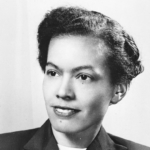 Pauli Murray (1910-1985) was a civil rights and women’s rights activist decades ahead of her time. Facing lifelong discrimination based on her race and sex, she persisted and become an accomplished attorney, author, activist, academic, and spiritual leader. Murray was a critical figure in both the civil rights and women’s rights movements. In 1940, fifteen years before Rosa Parks, Murray was arrested for sitting in the whites only section of a Virginia bus. She coined the term “Jane Crow” referring to the intersecting discrimination faced by African American women and was highly critical of sexism within the civil rights movement.
Pauli Murray (1910-1985) was a civil rights and women’s rights activist decades ahead of her time. Facing lifelong discrimination based on her race and sex, she persisted and become an accomplished attorney, author, activist, academic, and spiritual leader. Murray was a critical figure in both the civil rights and women’s rights movements. In 1940, fifteen years before Rosa Parks, Murray was arrested for sitting in the whites only section of a Virginia bus. She coined the term “Jane Crow” referring to the intersecting discrimination faced by African American women and was highly critical of sexism within the civil rights movement.
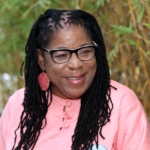 After Susan Burton’s five-year old son was accidentally hit and killed by a car, she numbed her grief through alcohol and drugs. As a result, she became trapped in the criminal justice system for nearly two decades before finding freedom and sobriety in 1997. Just one year later, Burton founded a nonprofit — A New Way of Life Re-Entry Project (ANWOL) — dedicating her life to helping others break the cycle of incarceration. ANWOL has provided direct services to over 1,000 women, over 75% of whom stay drug free and out of prison.
After Susan Burton’s five-year old son was accidentally hit and killed by a car, she numbed her grief through alcohol and drugs. As a result, she became trapped in the criminal justice system for nearly two decades before finding freedom and sobriety in 1997. Just one year later, Burton founded a nonprofit — A New Way of Life Re-Entry Project (ANWOL) — dedicating her life to helping others break the cycle of incarceration. ANWOL has provided direct services to over 1,000 women, over 75% of whom stay drug free and out of prison.
 Loretta Ross has dedicated her career to feminist issues with a focus on women of color. She helped create the theory of Reproductive Justice, adding a human rights framework to include everyone in reproductive rights issues. Ross is a rape survivor and survivor of sterilization abuse. Loretta J. Ross launched her feminist career in the 1970s as director of the D.C. Rape Crisis Center, one of the first centers primarily run by and for women of color. She is a Visiting Professor teaching courses on white supremacy, reproductive justice, and calling in practices at Hampshire College for the 2017-2018 academic year. Loretta Ross holds a B.A. from Agnes Scott College in Women’s Studies.
Loretta Ross has dedicated her career to feminist issues with a focus on women of color. She helped create the theory of Reproductive Justice, adding a human rights framework to include everyone in reproductive rights issues. Ross is a rape survivor and survivor of sterilization abuse. Loretta J. Ross launched her feminist career in the 1970s as director of the D.C. Rape Crisis Center, one of the first centers primarily run by and for women of color. She is a Visiting Professor teaching courses on white supremacy, reproductive justice, and calling in practices at Hampshire College for the 2017-2018 academic year. Loretta Ross holds a B.A. from Agnes Scott College in Women’s Studies.
Read more about these women here.
Museum celebrates African-American history in San Marcos
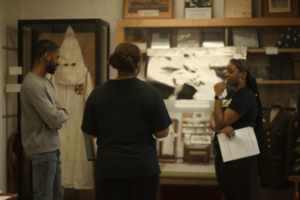
Volunteers at the Calaboose Museum giving a tour. (Photo by Marina Bustillo-Mendoza | Staff Photographer)
(The University Star) From jailhouse to dance hall to community center, the Calaboose African American Museum celebrates the contributions of African-Americans in San Marcos.
The Calaboose African American Museum was originally a jailhouse in San Marcos, established in 1873, drawing its name “calaboose” from a common term for jail during the reconstruction period.
In 1943, a United Service Organization dance hall was added to the jailhouse for black soldiers because during this time segregation was strictly enforced in the south. In 1954, it was converted into a community center for those who lived in the Dunbar/San Marcos area, according to the Calaboose Museum.
Johnnie Armstead, founder of the museum, created Calaboose to bring the African American community together and to educate community members about the history of San Marcos. (more)
Black history in brief
Clarion-Ledger (Jackson, Miss.):
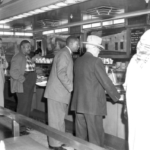
Desegregated lunch counter at Woolworth’s Department Store, San Antonio, March 16, 1960. (UTSA Libraries Special Collections)
March 19, 1960: San Antonio, Texas, became the first city from the Old Confederacy to integrate lunch counters. By July, lunch counters had also been desegregated in Nashville and three North Carolina cities.
March 20, 1852: “Uncle Tom’s Cabin” was published. The anti-slavery novel by Harriett Beecher Stowe helped convince Americans that slavery is morally wrong. The book sold 10,000 copies in the first week and 300,000 in the first year. A million copies of the book sold in Europe. It wound up being the best-selling novel of the 19th century, playing a vital role in changing the nation’s views toward slavery.
March 21, 1965: More than 3,000 demonstrators, led by Martin Luther King Jr. and protected by a federalized National Guard, began a weeklong march from Selma, Alabama, to the state Capitol at Montgomery to help bring attention to the struggle of getting African Americans registered to vote.
March 24, 1912: Educator and civil rights pioneer Dorothy Irene Height was born. She coordinated strategies with Martin Luther King Jr. and headed the National Council of Negro Women, which included “Wednesdays in Mississippi,” where interracial groups of women traveled to the state to push voter registration. In 1994, she received the Presidential Medal of Freedom, and a decade later, she received the Congressional Gold Medal. When she died in 2010, President Obama called her “the godmother of the civil rights movement.” In 2017, the U.S. Postal Service issued a Forever Stamp honoring her.
March 24, 2002: Halle Berry became the first African American to receive the Academy Award for Best Actress. She won the award for her performance in the movie “Monster’s Ball.” She accepted the Oscar on the same evening that Denzel Washington won Best Actor.
TIPHC Bookshelf
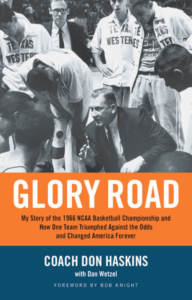 Published scholarship on black history in Texas is growing and we’d like to share with you some suggested readings, both current and past, from some of the preeminent history scholars in Texas and beyond. We invite you to take a look at our bookshelf page – including a featured selection – and check back as the list grows. A different selection will be featured each week. We welcome suggestions and reviews. This week, we offer, “Glory Road, My Story of the 1966 NCAA Basketball Championship and How One Team Triumphed Against the Odds and Changed America Forever,” by Don Haskins.
Published scholarship on black history in Texas is growing and we’d like to share with you some suggested readings, both current and past, from some of the preeminent history scholars in Texas and beyond. We invite you to take a look at our bookshelf page – including a featured selection – and check back as the list grows. A different selection will be featured each week. We welcome suggestions and reviews. This week, we offer, “Glory Road, My Story of the 1966 NCAA Basketball Championship and How One Team Triumphed Against the Odds and Changed America Forever,” by Don Haskins.
In 1966, college basketball was almost completely segregated. In the championship game for the NCAA title that year, Don Haskins, coach of the then little-known Texas Western College, did something that had never been done before in the history of college basketball. He started five black players, and in the now legendary game, unseated the nationally top-ranked University of Kentucky. Broadcast on television throughout the country, the Miners victory became the impetus for the desegregation of all college teams in the South during the next few years.
Now, for the first time, Hall of Fame coach Don Haskins tell his story. Beginning as a small-town high school basketball coach, Haskins was known for his tough coaching methods and larger-than-life personality. As a child growing up during the Dust Bowl in Oklahoma, he developed a strong set of values and discipline that he would instill in his players throughout his coaching career. With recollections from his former players, including those of the 1966 team, along with Haskins’s own Seven Principles for Success, Glory Road is the inspiring story of a living legend and one of the most respected coaches of all time.
With a foreword by basketball legend Bobby Knight, and coinciding with the release of the 2006 film Glory Road, the story of Don Haskins and his championship team is sure to become a classic for sports fans and historians.
This Week in Texas Black History
From TIPHC Texas Black History Calendar
Mar 19
 On this date, in 1966, the Texas Western University (now Univ. of Texas at El Paso) basketball team upset heavily-favored Kentucky, coached by the legendary Adolph Rupp, to win the NCAA national championship. Texas Western coach Don Haskins started five black players against the all-white Wildcats. Rupp had vowed that his team would never lose to black players. It marked the first time an all-black five competed against an all-white five in the NCAA title game. David Lattin – who starred at Houston’s Worthing High School – was the starting center for the Miners. The team’s story was highlighted in the movie, “Glory Road.”
On this date, in 1966, the Texas Western University (now Univ. of Texas at El Paso) basketball team upset heavily-favored Kentucky, coached by the legendary Adolph Rupp, to win the NCAA national championship. Texas Western coach Don Haskins started five black players against the all-white Wildcats. Rupp had vowed that his team would never lose to black players. It marked the first time an all-black five competed against an all-white five in the NCAA title game. David Lattin – who starred at Houston’s Worthing High School – was the starting center for the Miners. The team’s story was highlighted in the movie, “Glory Road.”
Mar 20
 Politician Willie Brown was born on this day in 1934 in Mineola. Brown became the first African American speaker of the California State Assembly in 1980 and served until 1995, the longest tenure for any of the Assembly’s speakers. From 1996-2004, Brown was mayor of San Francisco.
Politician Willie Brown was born on this day in 1934 in Mineola. Brown became the first African American speaker of the California State Assembly in 1980 and served until 1995, the longest tenure for any of the Assembly’s speakers. From 1996-2004, Brown was mayor of San Francisco.
Mar 21
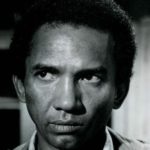 Actor Al Freeman, Jr. was born on this day in 1934 in San Antonio. Freeman starred on Broadway in the 1960s in productions such as “Tiger, Tiger Burning Bright” and in plays by James Baldwin and LeRoi Jones such as “Blues for Mister Charlie.” In 1979, he became the first African American to receive a Daytime Emmy for a soap opera for his role as a police captain on “One Life to Live.” He also drew critical acclaim for his portrayal of Malcolm X in the mini-series “Roots: The Next Generations,” and in 1991 played Elijah Muhammad in the Spike Lee movie “Malcolm X.”
Actor Al Freeman, Jr. was born on this day in 1934 in San Antonio. Freeman starred on Broadway in the 1960s in productions such as “Tiger, Tiger Burning Bright” and in plays by James Baldwin and LeRoi Jones such as “Blues for Mister Charlie.” In 1979, he became the first African American to receive a Daytime Emmy for a soap opera for his role as a police captain on “One Life to Live.” He also drew critical acclaim for his portrayal of Malcolm X in the mini-series “Roots: The Next Generations,” and in 1991 played Elijah Muhammad in the Spike Lee movie “Malcolm X.”
Mar 21
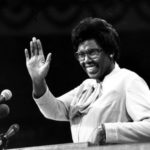 On this date in 1967, Barbara Jordan became the first black elected official to preside over the Texas State Senate. She was Texas’ first black state senator since 1883.
On this date in 1967, Barbara Jordan became the first black elected official to preside over the Texas State Senate. She was Texas’ first black state senator since 1883.
Mar 22
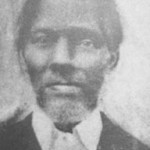 The first black state convention met in Austin on this day in 1866. The event, organized by the Texas State Central Committee of Colored Men, focused on the concerns – economic, political, civil rights – of black Texans. Rev. Jacob Fontaine presided over the meeting. Several similar conventions were held in the following years, the last in Houston in 1895, and some delegates were sent to national conventions to express those concerns.
The first black state convention met in Austin on this day in 1866. The event, organized by the Texas State Central Committee of Colored Men, focused on the concerns – economic, political, civil rights – of black Texans. Rev. Jacob Fontaine presided over the meeting. Several similar conventions were held in the following years, the last in Houston in 1895, and some delegates were sent to national conventions to express those concerns.
Mar 23
Former Atlanta (Ga.) mayor Maynard Jackson was born on this date in 1938 in Dallas. Jackson was Atlanta’s first black mayor, serving from 1973-1981 and 1989-1993 and was the first African American to serve as chief executive of any major Southern city. Jackson and his family moved to Atlanta when he was seven years old. He earned a political science degree from Morehouse College in 1956, then a law degree from North Carolina Central in 1964.
Mar 24
On this date in 1896, folklorist J. Mason Brewer was born in Goliad. Brewer, considered the premier African-American folklorist of the twentieth century became the first author and speaker to use black American dialect extensively in front of and to all audiences, particularly when dealing with folklore. Brewer attended black public schools in Austin and in 1917 received a B.A. from Wiley College in Marshall. In 1926, he was a professor at Samuel Huston (now Huston-Tillotson) College in Austin when he met University of Texas professor J. Frank Dobie who influenced Brewer to turn from publishing his own poetry to collecting and publishing black folklore. He was the first black member of both the Texas Folklore Society and the Texas Institute of Letters. Brewer’s most noted works include “Aunt Dicy Tales,” and an anthology, “American Negro Folklore,” for which he won the Chicago Book Fair Award in 1968.
Blog: Ron Goodwin, Ph.D., author, PVAMU history professor
Ron Goodwin is an assistant professor of history at Prairie View A&M University. Even though he was a military “brat,” he still considers San Antonio home. Like his father and brother, Ron joined the U.S. Air Force and while enlisted received his undergraduate degree from Texas Lutheran University in Seguin, Texas. After his honorable discharge, he completed graduate degrees from Texas Southern University. Goodwin’s book, Blacks in Houston, is a pictorial history of Houston’s black community. His most recent book, Remembering the Days of Sorrow, examines the institution of slavery in Texas from the perspective of the New Deal’s Slave Narratives.
Recent Posts
Wakanda Forever — Part 1
Ok, let’s begin by acknowledging that Wakanda is a fictional country in Africa. In the Marvel comics universe, it’s home to the superhero Black Panther. But there is still something about it that has recently struck a nerve in the black community. The Black Panther movie debuted in February to positive reviews and by February 25, earned more than $403 million in the US and Canada and $709 million worldwide. Wow. I must admit I’m
Not much has changed
“These are guys with the name D-Money, Smoothie, Shifty – these types of guys – they come from Connecticut and New York, they come up here, they sell their heroin, they go back home,” (Governor Paul) LePage told a large crowd. “Incidentally, half the time they impregnate a young white girl before they leave, which is a real sad thing because then we have another issue we have to deal with down the road.” January
Submissions wanted
Historians, scholars, students, lend us your…writings. Help us produce the most comprehensive documentation ever undertaken for the African American experience in Texas. We encourage you to contribute items about people, places, events, issues, politics/legislation, sports, entertainment, religion, etc., as general entries or essays. Our documentation is wide-ranging and diverse, and you may research and write about the subject of your interest or, to start, please consult our list of suggested biographical entries and see submission guidelines. However, all topics must be approved by TIPHC editors before beginning your research/writing.
We welcome your questions or comments. Please contact Mr. Michael Hurd, Director of TIPHC, at mdhurd@pvamu.edu.


